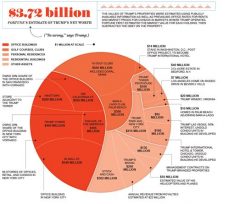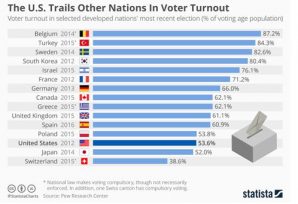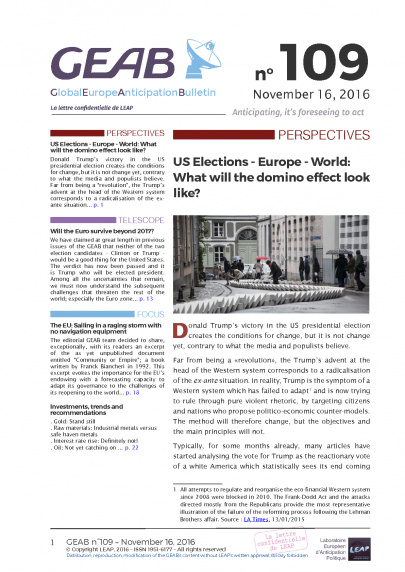GEAB 109

Donald Trump’s victory in the US presidential election creates the conditions for change, but it is not change yet, contrary to what the media and populists believe.
Far from being a “revolution”, the Trump’s advent at the head of the Western system corresponds to a radicalisation of the ex-ante situation. In reality, Trump is the symptom of a Western system which has failed to adapt[1] and is now trying to rule through pure violent rhetoric, by targeting citizens and nations who propose politico-economic counter-models. The method will therefore change, but the objectives and the main principles will not.
Typically, for some months already, many articles have started analysing the vote for Trump as the reactionary vote of a white America which statistically sees its end coming (today, 61% of the American population is white, but this share of the population is expected to turn into a minority within a generation’s time). Similarly, we believe that Donald Trump’s so-called Keynesian stance, in fact promises an outburst of neoliberal principles (deregulation, QE, financialisation, etc …). On all fronts, with the exception perhaps of foreign relations, Trump means the perpetuation of the former system’s actors and methods through the use of authoritarianism and lies.
More positively, Trump brings us closer to a real exit from the world before that he embodies and reveals. Trump will pull away the veil from America[2] thus opening the door to its reinvention.
The limits of political anticipation when predicting the consequences of Trump’s victory
Donald Trump ran a typically populist campaign, promising anything and everything, reacting emotionally to all the attacks against him, a campaign moreover caricatured and distorted by the media. Thus the greatest vagueness reigns as regards to his programme and character. Not only we do not clearly know who he is or what he wants, but there are also many question marks about what he is really able to do. It is not because he speaks strong that he is strong … It is most probably the opposite of that. As we said last March in our bulletin, “One can also speculate that Washington’s financial and military interests will change direction and form an alliance with Trump, who after all, before being a revolutionary, is first and foremost a pro-militarist billionaire with huge potential of convergence with their own interests. Thus, they could lead the media into a project of trivializing Trump and building on the US electoral system complexity, in order to reach their objectives”. This analysis, now validated, indicates that Trump will only do what the establishment wants him to do.

Figure 1 – Trump’s detailed wealth. Source : Fortune
Whilst anticipating in detail what the future will bring us remains a challenge at this stage, some broad lines appear more clearly. The fact is that, for several months now, the US election, and the two very different scenarios towards which the result was going to send the world, have blocked the horizon of political anticipation. Some trees are still obstructing the view, but at least we are now on the other side of the mountain. Here is the landscape which our team is now able to guess.
Bankruptcy of the american democratic system
First, we wish to clear the American people of the responsibility for the outcome of this vote. We have often said it: 58% of the US electorate considered the hypothesis of a Trump victory as catastrophic, but 52% thought the same thing of Clinton’s. When the democratic mechanism, supposedly rooted in a nation of 320 million citizens, manages to select two bad candidates, it is the system’s fault, not the people’s. Of course, the people get the leaders they deserve; but this is mostly true within the framework of a healthy democracy. When the mechanisms of democracy seize up, being a “good” citizen is no longer enough.
The reality is that at no stage can one consider that the Americans chose Trump… or Clinton for that matter:
. The complex and dishonest game of the primaries resulted in the appointment of two unpopular candidates (i.e. not corresponding to the will of the majority of American citizens)
. The presidential election validated the one candidate who received the fewest votes (Clinton garnered 400,000 votes more than Trump as part of the “popular vote”, which is the only truly democratic vote : one person – one vote, a principle whose derailing induced by the famous “electoral college” has now appeared clearly to US citizens).
. All this within a turnover just over half of the electorate (only 54.2% participated in the election this year). This is the lowest turnover in the past 20 years, with a large disaffection in the democratic camp. This phenomenon is not new but it is growing, despite the importance of the stakes[3].

Figure 2 – Voter turnout, other countries. Source: Statista
As we predicted throughout this year, the US presidential election of 2016 revealed a vast dysfunction of the democratic system which unfortunately might only be solved once it is halted and subsequently reconfigured. The “good news” is that the high-level of decay within American democracy is now a proven fact.
Populist dominos in Europe
As we said, let us be careful not to judge the Americans for the result of this vote. Especially since identical tests await the Europeans who, in the coming months, will face flawed choices as well. We certainly are not the only ones to anticipate that the Europeans are likely to not raise the bar higher than the Americans just did. On the contrary, Donald Trump’s victory allows us to anticipate a real tidal wave of populist victories in the countries at the heart of the EU (Italy, Austria, the Netherlands, Germany, France[4]). Unfortunately, this anticipation is not saying something new, but what instincts feel; our team argues as follows:
. There is of course the precedent provided by the latest British and American populist victories, which broke the powerful protective dikes we’d had against such scenarios since 1945. These dikes are now lying smashed in the two most emblematic countries of the victory against Nazism[5]. The term “tidal wave” is not used here in vain.
. There is also the feeling of increasing insecurity and uncertainty brought by Trump’s victory in the minds of the world’s citizens in general and of the Europeans in particular. The more people are afraid, the more they look for “strong men” to reassure them. Moments of great geopolitical tension are never favourable to democratic developments; our team is the first to constantly remind that the Putin of a vilified Russia or the Erdogan of an encompassed Turkey have no chance to evolve in the “right” direction from the point of view of democratic values. The Europeans also are afraid of what is happening at home and around them, and Trump’s advent is going to reinforce this anxiety, thus automatically increasing the likelihood of victories of similar characters in their home country.
But our team has identified another mechanism that virtually eliminates the possibility to anticipate a democratic resistance in the forthcoming European elections. European political life is composed of two large camps[6]:
– on the one hand, we have the transatlantic-European technocracy. Composed of colourless politicians, eminences grises and shadowy officials, this group is in command of Europe in Brussels and in most European capitals; they are the craftsmen of this undemocratic EU which is now collapsing; their predicate is “no salvation for Europe outside the transatlantic axis”; they invaded the national and European state apparatus since the fall of the Wall in 1989 and more visibly since 2003 in retaliation for the “great treason[7]” of Chirac / Schroeder at the UN ; they believe in NATO, the Euro-Dollar parity, the TTIP and EU-US integrated intelligence systems, among other things.
– on the other hand, there are the nationalist populist forces with a strong pro-Russian tendency. They are anti-European in the name of freedom even if they do not give a damn about democracy; they are classically “identitarian“; they worship strong political figures, especially white and Christian ones; Vladimir Putin has been their favourite, until now.
The technocratic camp, facing the gigantic crisis which affects them, is increasingly tempted by the path of populism, one very useful to calm people down and try to regain control. But the Russian tendency of the populist camp has hitherto prevented them from going very far in their direction. What Trump’s victory changes is that the populists now have on America’s side a model of an attractive strong white and Christian man. The conditions of the convergence between the two camps are therefore gathered: populism, transatlantism, identitarism, Europeanism … are no longer incompatible. The technocrats who energise the system will, at the very least, “let things happen”.
For all these reasons, we are no longer able to anticipate anything other than the European populist tidal wave in 2016-2017. This tide will not consist merely in victories of populist candidates but in the fact that, in one way or another, the populist theses will end up being on all governmental agendas in Brussels and the great European capitals. Look what happened in the UK, where it is not UKIP but UKIP’s agendas which are currently in power….
Login

We have claimed at great length in previous issues of the GEAB that neither of the two election candidates - Clinton or Trump - would be a good thing for [...]
The editorial GEAB team decided to share, exceptionally, with its readers an excerpt of the as yet unpublished document entitled "Community or Empire"; a book written by Franck Biancheri in [...]
Gold: Stand still Great caution is required on all fronts now that Mr Trump has been elected as president. This principle will transversally mark every one of our recommendations. The [...]
